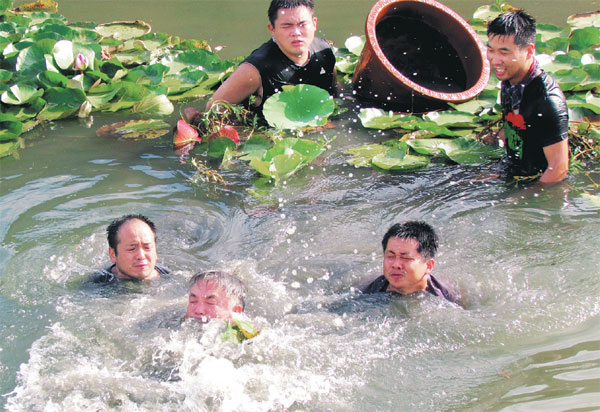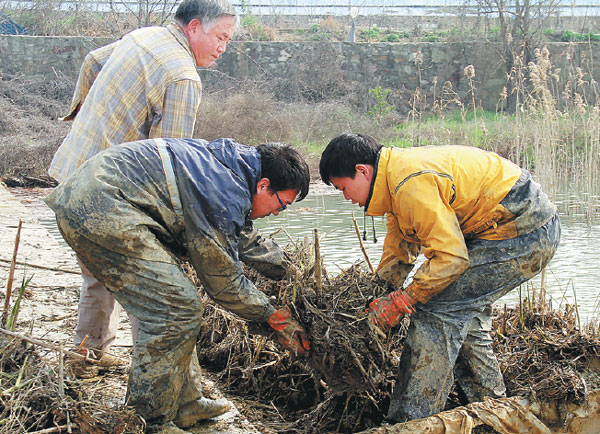Plants and passion restore troubled waters
Updated: 2016-02-03 08:17
By iu Kun and Wang Yanfei(China Daily)
|
||||||||
While China prepares to celebrate the Lunar New Year, one scientist has sacrificed the chance to be with family and friends so he can continue with his life's work, report Liu Kun in Wuhan and Wang Yanfei in Beijing.
With Spring Festival just days away, millions of Chinese people are making the long trek home for the most-important family reunion of the year.
However, Yu Dan won't be among them. Instead, Yu, a professor at the College of Life Sciences at Wuhan University, will remain at his research base on an island in the middle of Liangzi Lake, the second-largest freshwater body in Hubei province.
|
Yu Dan (middle) and student researchers attempt to plant aquatic seedlings in the bed of Liangzi Lake. Photos Provided to China Daily |
|
Yu Dan (left) and two students move seedlings for replantation in another part of the lake as part of an ecosystem restoration experiment in 2014. |
Even though the journey from the pier to the shore only takes about 10 minutes by speedboat, Yu rarely leaves the island, spending about 300 days there every year.
While the nation is enjoying the biggest family festival of the year, Yu won't even see his son, a doctoral student in nearby Wuhan, the provincial capital. Rather, he will continue the painstaking research that has dominated his life for more than 20 years, and has provided potential solutions to help restore damaged freshwater ecosystems.
Yu's strategy, which addresses a range of environmental problems, involves planting aquatic seedlings underwater to halt and even reverse environmental degradation. Aquatic plants absorb nutrients, such as nitrogen and phosphorus, which deprive blue-green algae of food, thereby improving the quality of the lake's water.
Once, Liangzi Lake, in central China, was a paradise for migrating birds. Situated on the south bank of the middle reaches of the Yangtze River, it is an ideal resting place for birds in winter, and is also a key provider of fresh water for the surrounding communities, where it is used for drinking and agriculture.
But, in common with many other bodies of water in China, the lake's complexion changed, and what was once a haven of aquatic plant life was, until recently, clogged with blue-green algae that reduced the level of oxygen in the water and resulted in the deaths of aquatic animals and plants.
In the 1980s and '90s, the annual summer outbreaks of blue-green algae began to occur more frequently after fishermen started using explosives and toxins to kill fish, and aquatic farmers poured chemicals into the water to prevent diseases that affect aquatic life.
The moves led to severe eutrophication, a form of water pollution caused by large quantities of external nutrients entering the water, helping the algae to grow more quickly.
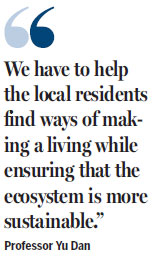
The outbreaks not only produce dangerous toxins and raise the costs of treating the water to make it suitable for human consumption, but also create dead zones where the absence of oxygen kills fish and aquatic plants.
By the early 1990s, the lake's ecosystem had almost been destroyed. "It was no longer a good place for birds to stay," Yu said. "Because the lake is located within the densely populated city of Wuhan, every step toward restoring the eco-balance has been difficult."
Wang Chao, vice-chancellor of Hohai University, a research institute in Nanjing, Jiangsu province, said the problem isn't confined to Liangzi Lake: "Algal blooms are a major source of pollution in the lakes along the Yangtze River, and about 69 percent of them are in a state of eutrophication."
Dedication and passion
In 1992, concerned by the worsening water quality, Yu joined Wuhan University and settled on the island to oversee a team of researchers investigating the lake's ecosystem. "It was much more convenient for me to build experimental facilities on the island," he said.
His lonely vigil is fired by dedication and a passion to restore the lake's ecosystem.
Having collected more than 180,000 samples from across the country, Yu has built a database of aquatic plants and selected the most appropriate species to bring life back to the lake.
"We bring native plants such as Potamogeton Maackianus (a type of pondweed), which have long been crowded out by invasive species, back to the lake," he said. "By restoring the underwater vegetation with these almost extinct local species, we were able to bring the environment back to its original state."
Through years of research, Yu discovered that plants known as aquatic macrophytes should be planted during winter so they will purify the water before summer, the main season for outbreaks of blue-green algae.
A typical day for Yu involves getting up at 6:30 am, patrolling the lake, planting macrophytes and collecting plant samples. He rushes lunch and dinner, and usually works until about 8 pm.
The harsh environment proved too much for most of his student researchers, and only a handful stayed with Yu until they finished their studies.
"We need to get up early to collect specimens and go on field trips with the professor," said Huang Xiaolong, 27, a PhD student in Yu's current research team.
"The work demands actual physical strength; planting aquatic macrophytes requires diving to the bottom of the lake and staying there for more than 30 seconds. We have to plant each macrophyte ourselves," he said, adding that he has not only learned a lot about aquatic plants, but also gained a sense of how to appreciate their beauty.
Xu Xinwei, 40, associate professor of ecology at Wuhan University, was one of the few students who stayed with Yu in the early days. He also worked with Yu as a graduate student, and the two men have now been conducting their research for more than 10 years.
"Professor Yu's research is based on his long experience, well-thought-out plans and his dedication," Xu said. "His research could have a long-term impact on future ecological studies."
To protect the macrophytes, Yu's team plants lotus and water chestnuts, which can be harvested and sold by local residents, reducing the need for them to catch fish or interfere with other plant life, "so that the restored region will not be affected by human activity", according to Yu.
"We do this purely for the public good, not for economic return. We have to help the local residents find ways of making a living while ensuring that the ecosystem is more sustainable," he said.
Top ranking
Yu's efforts have paid off. According to local environmental-protection organizations that have monitored the lake, the water quality has been raised to Levels I and II, which both meet the national standards for drinking water. In 2011, Liangzi Lake was regarded as the cleanest freshwater body in China and ranked top out of nine "significant lakes" by the Ministry of Environmental Protection.
In 2002, Yu also brought macrophyte seeds and propagules - vegetable structures, such as buds, that are capable of forming new plants - to Changtan Reservoir, a lake in Zhejiang province that had been afflicted by blue-green algae for three years. The team grew 666 hectares of aquatic plants, and a year later, the quality of water in the lake had risen to Level II.
Although the method has been successful in Liangzi Lake and other pilot regions, it has not been widely used in other polluted lakes.
That's because of a shortage of labor and the fragile nature of ecological systems, according to Yu.
"Machine operations are unable to replace human labor," he said. "We hope to promote the method in other areas, but not everyone is willing to devote so much effort. If a natural disaster hit the region, the only thing that we could do would be to start all over again."
Yu's years of effort were almost destroyed by floods in 1998, when the plants he had introduced were killed off. In 2010, disaster loomed again when the lake broke its banks and flooded the surrounding area for 47 days, leaving a trail of dead snails, shrimps and rotting vegetation, which threatened the water quality, when the waters receded.
In response, Yu and his team planted more than 5,000 kg of seeds, covering more than 80 percent of the lakebed.
Although the elements and natural disasters can make the work seem an unending and thankless task, Yu is determined to maintain his pace.
"The eutrophication of the water is likely to continue, and we can never be too careful about controlling water pollution in the lake. We must make great efforts to make it work," he said.
Contact the writers at liukun@chinadaily.com.cn and wangyanfei@chinadaily.com.cn
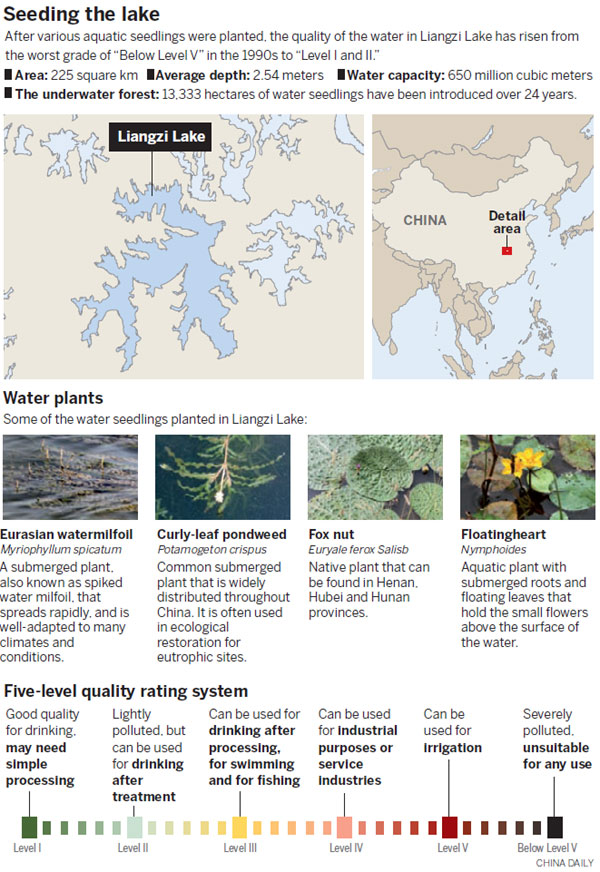
(China Daily 02/03/2016 page6)

 China's 'Moon Walker' sends back stunning HD photos
China's 'Moon Walker' sends back stunning HD photos
 Starbucks, office rents and CEOs form alternative outlook on China
Starbucks, office rents and CEOs form alternative outlook on China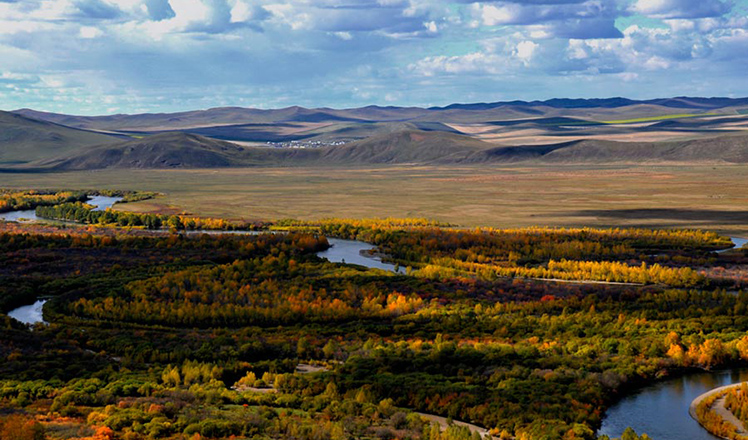
 China's most beautiful wetlands
China's most beautiful wetlands
 Premier Li takes Spring Festival greetings, and gifts, to old folk
Premier Li takes Spring Festival greetings, and gifts, to old folk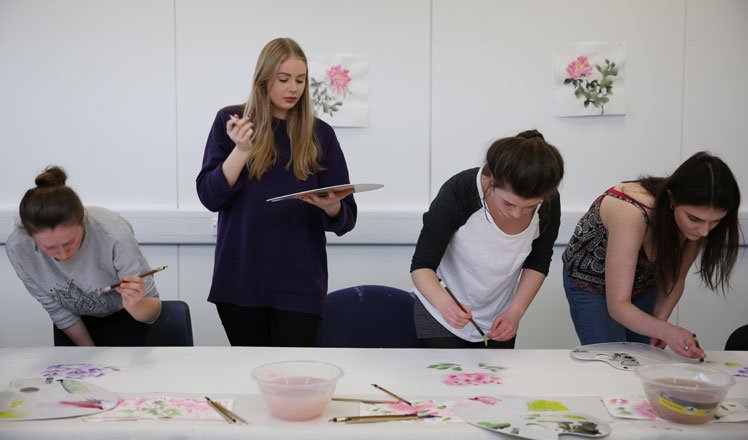
 International friendship blossoms in peony painting
International friendship blossoms in peony painting
 Culture Insider: Little New Year
Culture Insider: Little New Year
 Global celebrations mark Chinese New Year
Global celebrations mark Chinese New Year
 Motorcycles ride home for Spring Festival reunion
Motorcycles ride home for Spring Festival reunion
Most Viewed
Editor's Picks

|

|

|

|

|

|
Today's Top News
National Art Museum showing 400 puppets in new exhibition
Finest Chinese porcelains expected to fetch over $28 million
Monkey portraits by Chinese ink painting masters
Beijing's movie fans in for new experience
Obama to deliver final State of the Union speech
Shooting rampage at US social services agency leaves 14 dead
Chinese bargain hunters are changing the retail game
Chinese president arrives in Turkey for G20 summit
US Weekly

|

|
